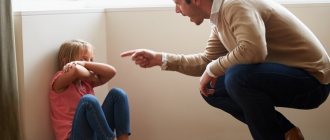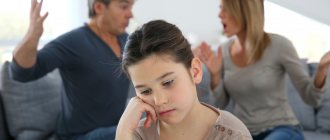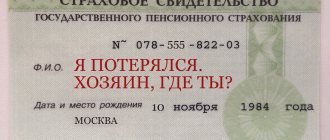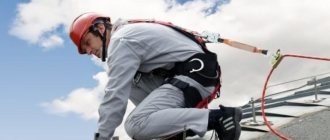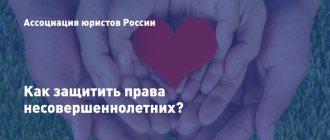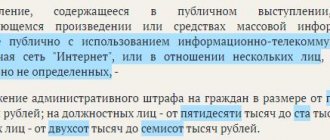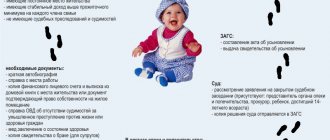Rights of minors
The Family Code of the Russian Federation assigns a number of property and non-property rights to the child. The latter include the following provisions defined in Art. 54-58 RF IC:
- Children under 18 years of age have the right to live with their parents, if possible, in a family setting . If the parents are not deprived of parental rights, are competent and are not removed from raising the child due to alcohol and drug abuse, the child’s place of residence is determined with the parents or with one of them. Education means the whole range of measures aimed at caring for, monitoring the development and physical condition of the child, ensuring his education and maintenance. Parents are also obliged to pay attention to the moral state of the child and the formation of moral values.
- The right to communicate with relatives . If this is not excluded by a court decision, the child has the right to communicate with all blood relatives, including grandparents. If one of the parents prevents this communication, he violates the rights of the minor.
- The right of children to have and express their personal opinions . The child's opinion must be taken into account when making any decision directly affecting his interests. It is important to understand that, starting from the age of ten, the opinion of a minor is taken into account, and sometimes is decisive when making court decisions regarding the deprivation and restoration of parental rights, determining the child’s place of residence, as well as when adopting and changing the name, patronymic and surname.
- Any child has the right to a first name, patronymic and last name . The child's patronymic is determined by the father's name, and the surname can be passed on from one of the parents.
- The child's right to protect his rights and interests . The main functions of protecting the rights and interests of the child are assigned to parents. If parents live separately from a child, this does not relieve them of the obligation to protect his interests. If parents are absent, deprived of parental rights, incompetent or abuse alcohol and drugs, all functions for protecting the rights of the child are assigned to the guardian, adoptive parent or guardianship authorities. At the time when a child is in a children's educational or medical institution, the administration of this center must monitor compliance with their rights.
- Minors have the right to protection from parental abuse and respect for their human dignity . This point refers to a wide range of factors. Parents must provide the child with comfortable conditions for mental development and maintaining optimal morale.
As for the property rights of minor children, they are determined by Article 60 of the Family Code of the Russian Federation. According to this act, every child has the right to financial support from his parents and other relatives. If parents refuse to support their children, the material resources necessary to maintain decent provision for the child are recovered through the courts. Also, this provision of the RF IC determines the rights of children to property received as a result of inheritance or donation. Before reaching the age of legal capacity (from 14 to 18 years), the parent guardian or an authorized person must manage the property and income of the child. Upon reaching the age of 14, according to Article 26 of the Civil Code of the Russian Federation, he can himself enter into property transactions with the written consent of his representative.
An important feature is the fact that emancipated (freed from parental care) children and minors who have previously entered into an official marriage can represent their interests themselves, including during court proceedings.
General provisions
Children's rights are enshrined in our country in many legislative norms, ranging from the Constitution of the Russian Federation and federal legislative acts to various codes. But still, this issue is considered more extensively in the Family Code of the Russian Federation and Federal Law-214 “On the basic guarantees of the rights of the child in the Russian Federation.” In addition, key rights are also enshrined at the international level in the UN Convention.
At the legislative level, it is determined that all children who have not reached the age of majority have certain rights and freedoms guaranteed to them at the highest level. And if it is established that there is a violation of rights and freedoms, the violators will be held accountable.
Where to contact?
If you witness or learn of a violation of a child's rights, you must take immediate action. Like the minor himself, whose rights have been violated, any citizen has the right to appeal to the following authorities:
- law enforcement agencies - this includes the prosecutor’s office, internal affairs bodies and the commission for minors;
- Guardianship and trusteeship authorities are the main government body authorized to protect the rights and interests of children, both those living in the family and those left without guardianship.
Depending on the chosen path, each body carries out certain activities.
Guardianship and trusteeship authorities
These organizations are executive authorities of a constituent entity of the Russian Federation. The tasks set before the guardianship and trusteeship authorities are aimed at protecting the rights of both those persons over whom guardianship has been established and those who act as guardians of minors or incapacitated persons. The main functions of the Guardianship and Trusteeship Authorities are reduced to the following provisions:
- Identification and registration of persons who need guardianship over them.
- Selection of citizens and families who are ready to take on the responsibilities of guardians and trustees for children left without parental care and living in a dysfunctional family or child care institution.
- Supervising the performance by guardians and trustees of the duties assigned to them by law. In particular, this provision includes checking the living conditions and detention of minors.
- If obvious violations are detected, guardians are removed from their duties in relation to the ward.
- Compliance with the property rights of minors and incapacitated citizens, up to the issuance of permits for property transactions.
- Representation of the rights and interests of wards in court and other government bodies.
- Providing comprehensive assistance to guardians in the performance of their legal duties to ward children and incapacitated citizens.
Prosecutor's office
The powers of the prosecutor from the point of view of protecting the rights of minors include, first of all, the initiation of legal proceedings regarding the deprivation or restriction of parental rights, as well as on issues of criminal liability for evading their direct parental responsibilities. The prosecutor also takes an active part in cases concerning adoption and revocation of adoption. In addition, prosecutors are responsible for protecting children from information and propaganda that may have a negative impact on their moral and mental development.
By contacting the prosecutor's office, every citizen can be sure that the application will be considered by the relevant authorities and, if facts of violation of the rights of minors are confirmed, legal proceedings will be initiated.
Juvenile Affairs Commission
Commissions on juvenile affairs can be created by both the highest state authorities and local governments. As a collegial body, the main tasks of the commission on juvenile affairs are to protect the rights and interests of children, oversee the development, education and living conditions of minors, as well as prevent child crime and homelessness.
When contacting the juvenile affairs commission, you should understand that this body has the following powers:
- development of programs to protect the rights and interests of minors;
- implementation of measures to prevent homelessness and delinquency among children;
- carries out identification and supervision of minor citizens who are forced to live in socially dangerous conditions;
- takes direct part in court hearings related to violations of children's rights, etc.
In addition to the listed structures, which play a key role in the implementation of laws on the protection of the rights of minors, these functions are also performed by a number of other bodies and public organizations. Thus, having witnessed a violation of a child’s rights, it is also advisable to contact the Center for Social Assistance to Family and Children, the Social Rehabilitation Center for Minors, the Center for Assistance to Children Without Parental Care, etc.
Administrative liability for infringement of children's interests
If facts of infringement of children's freedoms in the family are established, those responsible may be subject to certain measures, including deprivation of parental rights. However, such a decision will be made only if specific facts are established that parents (guardians) are not fulfilling their responsibilities properly.
If adults ignore the needs of a minor or infringe on his interests, administrative proceedings may be applied against them, which establish penalties in the form of fines in the amount of 100 to 500 rubles.
If a child is hidden against his will from relatives, the fine will be more significant and will range from 2 to 3 thousand rubles. In the event of a repeated violation, slightly different measures will be applied to the perpetrator, in particular a fine of 4 to 5 thousand rubles and prison arrest for 5 days.
How are children's rights protected?
Due to the fact that quite often it is parents, who by law must respect the rights and represent the interests of their children, who act as violators of these rights, the law also provides for other mechanisms for protecting the rights of minors. In particular, if the interests of the parents and the child diverge, the guardianship and trusteeship authorities should intervene in the situation, which are designed to protect the child’s rights to life, health, decent maintenance and upbringing. As mentioned above, the law specifies the child’s own request for help as the main protection mechanism, but most often the guardianship and trusteeship authorities receive information about violations of children’s rights from third parties. These could be teachers, educators, neighbors, relatives and family friends. The guardianship and trusteeship authorities are obliged to respond to any such appeal and check the situation in the family.
In cases where violations of the rights of a child involve cruel treatment and violation of his sexual integrity, the guardianship and trusteeship authorities closely cooperate with representatives of the internal affairs bodies, the prosecutor's office and the commission for minors. It should be understood that abuse means the systematic humiliation of a child, beatings and bodily harm, not providing the child with adequate nutrition, locking and leaving children alone, etc. All these unlawful actions can entail not only deprivation of parental rights, but also criminal liability.
It should be noted here that such norms apply not only to the actions of parents and guardians, but also to teachers, healthcare representatives and other institutions whose employees work with children. Improper performance of one’s duties and violation of the rights of a child may result in criminal penalties and a ban on conducting such activities from three years to life.
Violation and protection of the rights of minors
According to the RF IC, a child at any age has the right to contact the guardianship and trusteeship authorities with a complaint and application. Upon reaching the age of fourteen, a child has the right to apply on his own behalf to the judicial authorities. In addition, all officials are obliged to report to the guardianship and trusteeship authorities about violations of the rights of the child, if they noticed any.
If the child is in distress, the prosecutor initiates legal proceedings, during which persons violating the rights of the child may be deprived of parental rights, removed from cohabitation with the child, or have their rights of guardianship or adoption revoked. Cases involving parents’ abuse of their parental rights, as well as alcohol and drugs, can be especially complex.
The issue of protecting children's rights is significantly complicated by the fact that children themselves rarely seek help, even in cases of serious violations of their rights. This is due to children’s fear of their parents, as well as their reluctance to live in a children’s educational institution. In this regard, adult citizens must take an extremely responsible approach to protecting the interests of the child, as well as report any cases of non-compliance with the interests of minors.
